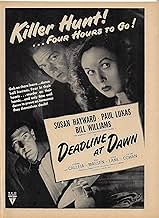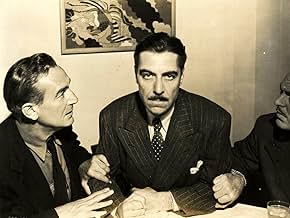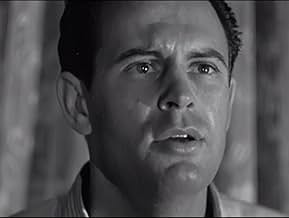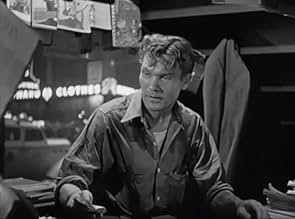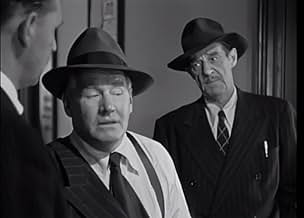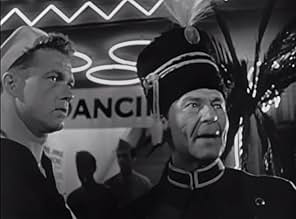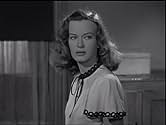AVALIAÇÃO DA IMDb
6,8/10
2,5 mil
SUA AVALIAÇÃO
Adicionar um enredo no seu idiomaAfter a woman he meets is murdered, a soon-to-ship-out sailor has until dawn to find the killer, aided by a weary dance hall girl.After a woman he meets is murdered, a soon-to-ship-out sailor has until dawn to find the killer, aided by a weary dance hall girl.After a woman he meets is murdered, a soon-to-ship-out sailor has until dawn to find the killer, aided by a weary dance hall girl.
- Direção
- Roteiristas
- Artistas
- Prêmios
- 1 indicação no total
Ernie Adams
- Waiter
- (não creditado)
Fred Aldrich
- Beefy Nightclub Guest
- (não creditado)
Walter Bacon
- Commuter
- (não creditado)
John Barton
- One-Legged Man
- (não creditado)
Billy Bletcher
- Waiter
- (não creditado)
- Direção
- Roteiristas
- Elenco e equipe completos
- Produção, bilheteria e muito mais no IMDbPro
Avaliações em destaque
This modest film noir is flat-out crazy and a tremendous amount of fun.
Bill Williams plays a sailor on leave who follows a floozy back to her room, passes out and then finds upon waking that the floozy is dead and can't remember what if anything he had to do with it. He's got to catch a boat (or is it train?) at dawn, and is afraid he'll be implicated in the murder if he doesn't find the true killer before then. He teams up with a dance hall hostess (Susan Hayward) and, before the evening's out, a cab driver (Paul Lukas) and sets out into the New York midnight to solve the crime.
The screenplay doesn't make a lick of sense, and my wife and I found ourselves actually laughing at the preposterous developments and turns in the story. It's hilarious how committed these three people are to solving this crime despite the fact that there's absolutely nothing attaching the sailor to it, and how easy a time they have following up on clues in as huge a city as NY despite the fact that the clues are things like "he was wearing a tuxedo" and "she had blonde hair." A plot twist at the movie's end, when the real killer is revealed, is right up there with the best of them. Oscar winner Paul Lukas brings much more acting ability to his performance than his role requires, and Susan Hayward is absolutely riveting. This was my first and so far only exposure to this acclaimed actress, and I look forward to many more.
What a blast this movie is!
Grade: A-
Bill Williams plays a sailor on leave who follows a floozy back to her room, passes out and then finds upon waking that the floozy is dead and can't remember what if anything he had to do with it. He's got to catch a boat (or is it train?) at dawn, and is afraid he'll be implicated in the murder if he doesn't find the true killer before then. He teams up with a dance hall hostess (Susan Hayward) and, before the evening's out, a cab driver (Paul Lukas) and sets out into the New York midnight to solve the crime.
The screenplay doesn't make a lick of sense, and my wife and I found ourselves actually laughing at the preposterous developments and turns in the story. It's hilarious how committed these three people are to solving this crime despite the fact that there's absolutely nothing attaching the sailor to it, and how easy a time they have following up on clues in as huge a city as NY despite the fact that the clues are things like "he was wearing a tuxedo" and "she had blonde hair." A plot twist at the movie's end, when the real killer is revealed, is right up there with the best of them. Oscar winner Paul Lukas brings much more acting ability to his performance than his role requires, and Susan Hayward is absolutely riveting. This was my first and so far only exposure to this acclaimed actress, and I look forward to many more.
What a blast this movie is!
Grade: A-
The real star of this underappreciated noir is Clifford Odets' dialogue, which you either love or you hate. I love it. Really terrific performances, and even the bit players are memorable. Look for Group Theater vet Roman Bohnen in a tiny role as the building janitor with a dead cat-- "she could practically speak." Or Jerome Cowan, a B-movie actor in a zillion Forties flicks, wonderfully slimy as a Broadway producer. Filmed on a backlot, but it seethes New York more than most location movies.
A young sailor on leave wakes up at midnight in a newsstand with bundles of money in his pockets and no recollection of his time spent with the wrong woman. Of course she turns out to be dead and he has until a bus leaves at 6am to discover the culprit or he gets the rap.
I like films with concentrated wandering, this one has it, the entire film like a slow ride across New York after hours in the backseat of a cab with windows rolled down, it's the middle of August, the macadam breathing out the day's heat again, or like lounging by the open window of your apartment with lights turned off, glimpses of strange figures stalking the empty and sweltering streets below and imagining mischief from them.
It has mood above all, latenight paranoia being sweated out from pores in the skin. Everything looks a bit unhinged in that magic-desolate way that is summer in the big city.
But this is deeply noirish in a key way, the way of the dumb guy's dream that crystallizes the essence of noir. Our man was out at night dreaming but has no recollection what about, except it involved offers of sex and illicit money. We presume he's innocent because of his naive blond looks and because he's the one telling the story, and is bewildered as he does, because more likely suspects are paraded, stories are piled, testimonies, conjecture, a drunk man uncovers hidden truth, a cab driver reflects about love, but the puzzle persists, the puzzle that is the night of life; we cannot really know, there is a blank spot at the center. Emptiness behind the stories that we make up to narrate our private worlds.
You will need no more eloquent parallel about what this is all about than a blind pianist among the suspects and being - mistakenly - sussed from his melodramatic reaction.
So we have sinister happenings back in the waking world, itself rendered as something you wake up from. Then our film as a dream attempting inner balance, so of course thick in coincidence, in strange but kind souls assisting, capped off with a miraculous revelation in the end that absolves guilt.
This is truly wonderful stuff that has burned itself into my visual imagination. It's clean and dark both, the shadows all in having traveled, having dreamed the night away.
I like films with concentrated wandering, this one has it, the entire film like a slow ride across New York after hours in the backseat of a cab with windows rolled down, it's the middle of August, the macadam breathing out the day's heat again, or like lounging by the open window of your apartment with lights turned off, glimpses of strange figures stalking the empty and sweltering streets below and imagining mischief from them.
It has mood above all, latenight paranoia being sweated out from pores in the skin. Everything looks a bit unhinged in that magic-desolate way that is summer in the big city.
But this is deeply noirish in a key way, the way of the dumb guy's dream that crystallizes the essence of noir. Our man was out at night dreaming but has no recollection what about, except it involved offers of sex and illicit money. We presume he's innocent because of his naive blond looks and because he's the one telling the story, and is bewildered as he does, because more likely suspects are paraded, stories are piled, testimonies, conjecture, a drunk man uncovers hidden truth, a cab driver reflects about love, but the puzzle persists, the puzzle that is the night of life; we cannot really know, there is a blank spot at the center. Emptiness behind the stories that we make up to narrate our private worlds.
You will need no more eloquent parallel about what this is all about than a blind pianist among the suspects and being - mistakenly - sussed from his melodramatic reaction.
So we have sinister happenings back in the waking world, itself rendered as something you wake up from. Then our film as a dream attempting inner balance, so of course thick in coincidence, in strange but kind souls assisting, capped off with a miraculous revelation in the end that absolves guilt.
This is truly wonderful stuff that has burned itself into my visual imagination. It's clean and dark both, the shadows all in having traveled, having dreamed the night away.
Deadline at Dawn (1946)
If you can overcome, or overlook, the slightly stilted plot and the improbability of the events (in an O'Henry kind of way, if you know his clever short stories, though the actual writer is Clifford Odets, whose politics are not very visible), you'll be able to catch the really fine acting and directing here. And the nicely felt night crime drama that is really just a beautiful sappy love story (the best kind). The cast is small, the plot twists unreasonable but still enchanting, and the effect, in the end, is tightly wound.
While you might think the murder is the central premise (and it's key, for sure), or the sailor's blackout is the main event (and it isn't, really), you will eventually see it's the sailor himself, his utter innocence, that is both the core of the film and the driving force. This is the Odets part of the writing, character driven, and the sailor, through some effect of drinking we assume, has had a brief blackout, and he comes to his senses on the streets of New York with a lot of cash in his pocket. He's troubled, but we sympathize. Then a woman he was with is found dead. Still, this sailor is such the definition of innocence, there's no doubt--almost no doubt--that someone else did it. But who? And how can he defend himself?
Enter Susan Hayward, playing at first a kind of professional dance companion (the innocent side of prostitution, and a good match for our man). After work, she wants to help him because he's so clearly a good person, and then a cabbie strangely gets involved, too, sucked into the idea that justice will go wrong if the real killer can't be found. The dead woman had a couple of unsavory friends, and these two get into the plot in stages, and what we end up with is half a dozen clearly defined people all fighting for some small piece of personal clarity and internal well being.
It helps that all the actors are first rate small time contributors (Hayward is the one star, and is terrific). It also helps that the whole scenario is limited in time and space, so we get to feel like we are there, in New York, in this small neighborhood at night. It's great stuff on that level alone. The director? It's his one and only film. But the cinematographer was an old pro at the peak of his career, Nicholas Musuraca, who did a whole slew of noirs and dramas, some worth seeing just for the photography ("Spiral Staircase" comes to mind, but see the IMDb list). So whatever the small time credentials of much of the cast, there is some seriousness here that won't let go.
If the plot is a little preposterous, it's only because it's trying to package things too neatly. The writing is first rate, beyond plot structure, with some classic quotable lines that are either film noir staples or philosophical nuggets (the latter from the cabby, in particular). A film that would reward a second viewing just for the details of dialog and camera-work.
If you can overcome, or overlook, the slightly stilted plot and the improbability of the events (in an O'Henry kind of way, if you know his clever short stories, though the actual writer is Clifford Odets, whose politics are not very visible), you'll be able to catch the really fine acting and directing here. And the nicely felt night crime drama that is really just a beautiful sappy love story (the best kind). The cast is small, the plot twists unreasonable but still enchanting, and the effect, in the end, is tightly wound.
While you might think the murder is the central premise (and it's key, for sure), or the sailor's blackout is the main event (and it isn't, really), you will eventually see it's the sailor himself, his utter innocence, that is both the core of the film and the driving force. This is the Odets part of the writing, character driven, and the sailor, through some effect of drinking we assume, has had a brief blackout, and he comes to his senses on the streets of New York with a lot of cash in his pocket. He's troubled, but we sympathize. Then a woman he was with is found dead. Still, this sailor is such the definition of innocence, there's no doubt--almost no doubt--that someone else did it. But who? And how can he defend himself?
Enter Susan Hayward, playing at first a kind of professional dance companion (the innocent side of prostitution, and a good match for our man). After work, she wants to help him because he's so clearly a good person, and then a cabbie strangely gets involved, too, sucked into the idea that justice will go wrong if the real killer can't be found. The dead woman had a couple of unsavory friends, and these two get into the plot in stages, and what we end up with is half a dozen clearly defined people all fighting for some small piece of personal clarity and internal well being.
It helps that all the actors are first rate small time contributors (Hayward is the one star, and is terrific). It also helps that the whole scenario is limited in time and space, so we get to feel like we are there, in New York, in this small neighborhood at night. It's great stuff on that level alone. The director? It's his one and only film. But the cinematographer was an old pro at the peak of his career, Nicholas Musuraca, who did a whole slew of noirs and dramas, some worth seeing just for the photography ("Spiral Staircase" comes to mind, but see the IMDb list). So whatever the small time credentials of much of the cast, there is some seriousness here that won't let go.
If the plot is a little preposterous, it's only because it's trying to package things too neatly. The writing is first rate, beyond plot structure, with some classic quotable lines that are either film noir staples or philosophical nuggets (the latter from the cabby, in particular). A film that would reward a second viewing just for the details of dialog and camera-work.
Explosive lighting by cinematographer Nick Murasaca; a twisty, turning plot by mystery writer Cornell Woolrich; literate dialogue with heart from playwright Clifford Odets; and an estimable ensemble cast of fine character actors, plus a young, beautiful, and surprisingly effective Susan Hayward -- it all adds up to make this a little film noir gem.
It's a very New York piece, though it's also an example of RKO Pictures at its Hollywood best. And yet, for a film noir, there's a surprising sweetness, a current of innocence personified by the sailor boy accused of murder in a nocturnal urban jungle of violence, betrayal and corruption.
Highly recommended.
It's a very New York piece, though it's also an example of RKO Pictures at its Hollywood best. And yet, for a film noir, there's a surprising sweetness, a current of innocence personified by the sailor boy accused of murder in a nocturnal urban jungle of violence, betrayal and corruption.
Highly recommended.
Você sabia?
- CuriosidadesJoe Sawyer's character of washed-up baseball player Babe Dooley was based on Chicago Cubs hitting great Hack Wilson whose alcoholism led to his steep professional and personal decline.
- Erros de gravaçãoAt the end, the main characters exit the 8th Police Precinct. It is night, and the streets are deserted. Yet when June and Alex drive away in the police car, it can be seen through the back window of the vehicle that the streets are bustling with activity, cars, and people, and it's bright and sunny.
- Citações
June Goffe: If you hear a peculiar noise, it's my skin creeping.
- ConexõesFeatured in Noir Alley: Deadline at Dawn (2017)
Principais escolhas
Faça login para avaliar e ver a lista de recomendações personalizadas
- How long is Deadline at Dawn?Fornecido pela Alexa
Detalhes
- Data de lançamento
- País de origem
- Idiomas
- Também conhecido como
- Un amanecer trágico
- Locações de filme
- Backlot, 20th Century Fox Studios - 10201 Pico Blvd., Century City, Los Angeles, Califórnia, EUA(New York night street scenes)
- Empresa de produção
- Consulte mais créditos da empresa na IMDbPro
- Tempo de duração
- 1 h 23 min(83 min)
- Cor
- Proporção
- 1.37 : 1
Contribua para esta página
Sugerir uma alteração ou adicionar conteúdo ausente

